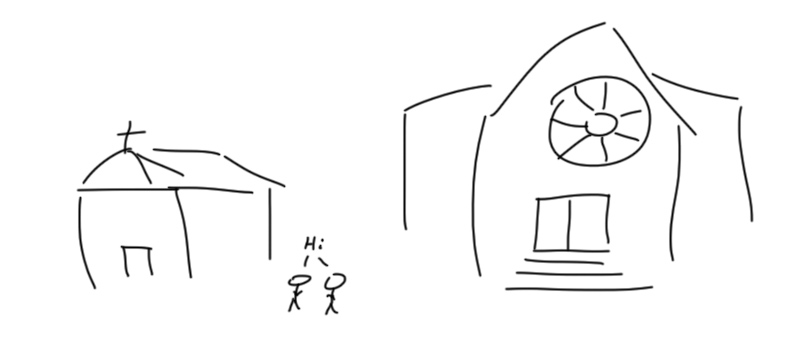The Story
Our boomerang kid just started college again. He and I got home about the same time and he asked if I'd be willing to help him work through math this year. "I realized," he told me, "that I crammed all of my math in high school. I could only do about four of the homework problems. I don't remember any of this!"
So we sat down to work through it. Everything went pretty well. He would get bogged down now and again by things -- "How do I handle the 1/20?" -- and his sloppy, incomplete notation while showing his work made me smile. The scribbles reminded me of my own math days and let me catch a glimpse of how frustrated my teachers must have been with me in high school. He was gaining in confidence and then we ran into a gem that went a little something like this:
13. A teacher will replace your lowest test score with the score you get on your final if that score is higher. What is the lowest score you can get if you want an average of 80 in the class and scored 86, 51, 30, and 81 on your other tests?
We looked at each other.
His eyes held the look of a potty training child who has just recognized their internal signals too late. I had a similar feeling, but of a person about to go into war who is terrified and responding bodily to that fear.
"Well..." I said, giving myself time, "...we know we need 80 on one side of the equation. And you remember how to calculate an average, right?"
He did.
I had now almost exhausted everything I had gleaned from MathTacular4: Word Problems. We had followed the steps outlined in that program and were almost there. But one more challenge lay ahead. Thankfully, MathTacular4 had taught me that the dreaded "Word Puzzler" enjoys sneaking things into the problems. I saw it. The 30 was out of place. The value was too small, as if it were trying to draw attention to itself surreptitiously.
"30 is going to be the lowest score that we'll replace with our final exam score. So we add 86, 51, 81, and 2x (the final score twice) and divide by 5."
His answer checked out and I breathed a sigh of relief.

MathTacular4: Word Problems
"You don't have to hang around if you don't want to. I could just call you when I have a question," he offered.
"No thanks," I said. "I need to work this through with you if I want to have a prayer of helping you at the end of the semester."
The next few questions were easy, asking us to subtract 7 from 142. I doubt I'll ever grasp the logic behind math textbooks.
The Lessons
First, if you -- like me -- haven't done math in over a decade, don't worry. Your children do not start with calculus. They start with number, shape, and color recognition. As you work along side them, you'll be ready to tackle limits and sine waves more prepared now than you were in college. Homeschooling lets you (re)learn stuff you missed the first time around!
Second, MathTacular is awesome. I love how even fun DVDs designed for 6th Graders -- or younger -- can be so applicable even for us adults and college students.
Third, there's help if you ever get stuck. The final problem was one of those "how much should this person invest in each fund if they want a yield of this amount" kind of problems. We tried. We scribbled. I got my own pad of paper and a pen. Finally we watched the example video lesson where each step was carefully explained and outlined. Halfway through the explanation we'd found what we needed to proceeded on our own from there. It was very rewarding and I recommended that he review this solution before the test. "That's definitely going to come back to bite you," I warned.
You don't have to know how to do everything. I think you'll be surprised by how much you learn alongside your children as you homeschool. And if math feels like this incomprehensible mess of squiggles and absurdity, check out MathTacular. These fun DVDs make math unbelievably understandable.
~Luke Holzmann
Filmmaker, Writer, Pseudo-Dad








